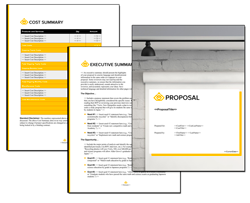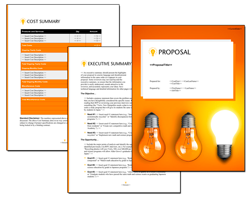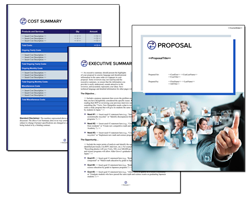
Write a Training Proposal that Wins
To win clients and articulate your training approach effectively, you need to master the art of writing a training proposal, including outlining a proposed training program that meets client needs and goals. This no-nonsense guide will steer you through the vital elements-from setting precise objectives and defining your training methodology to presenting a clear evaluation strategy. Ready to learn how to write a training course proposal that resonates with decision-makers? Let's get started.
Key Takeaways
- An effective training services proposal must clearly articulate SMART objectives, a detailed training methodology, a realistic budget and timeline, and a comprehensive evaluation process.
- Customizing the proposal to the client's specific needs and industry, leveraging expertise and experience, and using appropriate visuals and design are key to enhancing its relevance and persuasiveness.
- Using digital tools for proposal creation, collaboration, and incorporating feedback is essential for efficiency and producing a polished, engaging final product that stands out to decision-makers.
Understanding the Importance of Training Proposals

Training proposals are more than mere documents-they are catalysts for change. They play a pivotal role in delineating employee development strategies, fostering organizational growth, and securing projects with clients. Employee training serves as a bridge, connecting daily activities with broader organizational goals and highlighting skill gaps that need to be addressed in future training programs.
The process of drafting training proposals contributes to an individual's professional development by:
- Refining problem-solving and written communication skills
- Providing structure and clarity
- Establishing credibility
- Showcasing the ability to effectively communicate solutions
- Incorporating feedback from mentors and peers
In addition to these benefits, training proposals allow authors to showcase their ability to communicate solutions and effectively incorporate feedback from mentors and peers.
Key Elements of an Effective Training Services Proposal
A successful training proposal needs the right ingredients. The 'ingredients' for an effective training services proposal are:
- Clear objectives
- A detailed training methodology
- A realistic budget and timeline
- A comprehensive evaluation process.
Let's examine these essential elements.
Setting Clear Objectives

Every journey needs a destination, but every training proposal requires specific, measurable, attainable, relevant, and time-bound (SMART) objectives to meet clients' strategic goals. A clear definition of these objectives should focus on expected participant and organizational outcomes to ensure alignment with client needs and goals.
However, it's crucial to articulate these objectives clearly, along with their benefits and return on investment. Decision-makers may only accept proposals that do this. Your training proposal is a roadmap, and objectives are the landmarks that guide your journey.
Describing the Training Methodology
Once objectives are set, the next step is to chart the course - this is where the training methodology comes in. It's crucial to consider a variety of training methods, including a well-designed training course with options such as:
- Instructor-led training
- E-learning
- Blended learning
- Workshops
- On-the-job training
These methods should be chosen to suit different learning preferences and requirements.

The proposal details the training program's design and content, including an outline of learning modules, topics, and activities based on sound learning methods and instructional design principles. Interactive elements such as quizzes and gamified activities are incorporated to keep trainees engaged and facilitate better knowledge retention. And let's remember the importance of effective audio reinforcement to ensure all trainees can hear and understand the training content.
Presenting a Realistic Budget and Timeline
A comprehensive budget breakdown and a timeline are like the fuel and mileage of your journey. They are essential for outlining the training program's preparation, delivery, and evaluation stages, ensuring it is well-structured and feasible.
The timeline should present details on the schedule and logistics, including:
- Proposed duration
- Location
- Prerequisites
- Class size limitations
- Necessary technology
- Materials
This affirms that all components are accounted for and thoughtfully scheduled.
Meanwhile, a comprehensive budget breakdown in the proposal is crucial, detailing costs for:
- Materials
- Trainers
- Technology
- Travel
- Other expenses
This helps clients understand financial expectations. The budget section should include straightforward cost estimates and a tabular presentation for clarity. Address potential cost questions head-on to ensure client confidence in the financial aspects.
Demonstrating the Evaluation Process
Evaluation is the compass that guides the success of a training program. It is a critical component of every training proposal, ensuring the effectiveness of the training program and accurately assessing its impact. The training proposal should detail the evaluation methods, such as:
- 360-degree feedback
- Customer feedback surveys
- Pre- and post-training surveys
- Tests and assessments
It should also identify metrics like employee satisfaction, productivity, and retention rates to measure success.
Including a brief plan outlining the training implementation, needed resources, and the process for measuring the training's impact helps clarify the program's value to stakeholders. Mention offerings such as follow-up sessions, mentorship programs, or additional resources that provide ongoing support and contribute to the organization's sustainable integration of new skills.
Training Services Use Cases
To better understand the application of training services proposals, let's consider some examples from diverse industries:
- Compliance training programs help employees understand laws and regulations relevant to their jobs, preventing misconduct and ensuring proper governance.
- Leadership training programs enhance decision-making, team building, and leadership styles, ultimately increasing employee morale and retention.
- Quality assurance training helps employees improve processes to ensure products or services meet quality standards, contributing to customer satisfaction and loyalty.
- Sales training enhances sales teams' skills, teaching them novel approaches to selling to improve their ability to generate revenue.
- Technical training helps employees master new software applications and technologies critical to staying competitive in their respective fields.
- Soft skills training programs work on personal attributes like communication and problem-solving, which are crucial for building stronger teams and improving customer relations.
- Diversity training programs foster a workplace that respects various cultures, backgrounds, and perspectives, reducing workplace discrimination and harassment.
- Safety training is vital in industries involving physical labor to minimize risk to employees and the company. Programs are customized to specific industry needs.
- Upskilling programs help employees develop relevant competencies for the current work environment, bridging existing skills gaps.
- Reskilling initiatives help employees transition into different roles or meet new job demands within an organization, especially when previous roles become obsolete due to technological advancements.
These examples demonstrate the wide range of training programs and training courses you can implement to address specific needs in different industries.
Tailoring Your Training Proposal to Different Industries

A training proposal that meets industry-specific regulations, standards, and best practices ensures its relevance and compliance. This involves focusing on skills and competencies uniquely relevant to that industry and ensuring the program addresses these specific areas.
Moreover, aligning the training proposal with the organization's values and culture involves using appropriate language and scenarios that resonate with the company's ethos and objectives. The corporate training proposal template should also be adaptable to different industry contexts, considering specific skills, requirements, or organizational culture to enhance its relevance and effectiveness.
To create a strong pitch, it is crucial to consider the priorities of the industry's decision-makers and provide concrete examples of past successful training programs.
Showcasing Expertise and Experience
Your experience and expertise are your training services' most significant selling points. Including details of past successful training programs and the specific benefits they delivered helps establish your track record in the industry. Omitting examples of past successful programs, case studies, or testimonials can significantly weaken the training proposal's persuasive power.
Your proposal also serves as a platform to showcase your competitive advantages and unique qualities. Using persuasive language to highlight qualifications and past achievements can convince clients of your competence. Consider incorporating a snippet of each instructor's bio within the proposal to illustrate the depth of expertise and experience behind the training programs offered.
Leveraging Visuals and Design for Impact

A picture is worth a thousand words, and a well-thought-out design can make your proposal stand out. Using training proposal templates ensures the writing process is efficient, helps meet organizational objectives, and maintains accessibility for decision-makers. A well-structured proposal enhances professionalism, raises the perception of quality, and increases the likelihood of client acceptance.
Visual aids like charts, graphs, and diagrams can simplify complex concepts for better understanding in training proposals. Animations and videos make processes in training proposals more engaging and memorable. Presentation tools create engaging and interactive content for training proposals, supporting collaborative learning environments. Consider important design principles for training proposal presentations to ensure readability and engagement.
Here are some related samples included in every downloadable Proposal Pack
- Educational Grant Sample Proposal
- Educational Grant Sample Proposal #2
- Research Assistant Sample Proposal
- Corporate Event Planner Services Proposal
- USDA Federal Government Grant Proposal
- Training Services Sample Proposal
- Software and Hardware System Sample Proposal
- Charter School Educational Sample Proposal
- School Funding Request Sample Proposal
- Disaster Preparation and Training Sample Proposal
Here are some related downloadable templates
- Awareness and Sensitivity Training in the Workplace Proposal
- Business Coach Mentoring Services Proposal
- Business Coaching Proposal Template
- Corporate Training Services Proposal Template
- Crisis Resolution Training Proposal
- Disaster Preparation and Training Proposal
- EMS Training Services Proposal
- Emergency Response Planner Training Proposal
- Executive Leadership Coaching Services Proposal
- Inmate Job Training Program Proposal
- Interagency Training Center Proposal
- Leadership Development Program Proposal
- Life Skills Tutoring Services Proposal
- Moving Training Services Online Proposal
- Racial Diversity Training and Awareness Proposal
- Retraining Workers Skills Development Proposal
- Safety Strategy and Training Program Proposal
- Safety Training and Consulting Services Proposal
- Sales Training Proposal Template
- Specialized Training Educational Proposal
- Training Plan
- Training Program Curriculum Innovation Proposal
- Training Services Proposal
- Training for Skills Development Proposal
- Tutoring Educational Services Proposal
- Vocational Education Proposal
- Vocational Job Training for Youth Proposal
- Coaching Proposal Template
- Mentoring Proposal Template
- Life Coach Proposal Template
- Life Coaching Proposal Template
- College Preparation Services Proposal Template
 Proposal Kit Professional provides the most content, including legal contracts and a free design theme pack. Plus, advanced software features include custom branding and customizable quoting databases.
Proposal Kit Professional provides the most content, including legal contracts and a free design theme pack. Plus, advanced software features include custom branding and customizable quoting databases. Proposal Pack for Any Business covers all types of proposals and includes samples and topics for this type of proposal. There are also many specialty design themes available you can use to match the visual design to your logo or type of business. Select any one Proposal Pack and you are covered.
Proposal Pack for Any Business covers all types of proposals and includes samples and topics for this type of proposal. There are also many specialty design themes available you can use to match the visual design to your logo or type of business. Select any one Proposal Pack and you are covered.Tips for Writing a Persuasive Training Services Proposal Using a Training Proposal Template
Writing a persuasive training services proposal is more art than science. Here are some tips to help you create an effective proposal:
- Begin by stating the mission and goals of the training program.
- Keep the content brief, persuasive, and jargon-free to ensure the client understands it.
- Outline the tangible and intangible benefits that the proposed training will deliver, including improved employee performance, achievement of organizational goals, and enhanced personal development of employees.
Employ a well-designed training proposal template for readability and professionalism, and ensure the proposal is thoroughly proofread, revised, and contains accurate cost estimates and realistic timelines. Conclude the proposal with a compelling summary that encapsulates the key points and includes a clear call to action with the next steps for the client, exhibiting commitment to client satisfaction and growth.
Case Study: A Successful Training Services Proposal
Let's combine all the elements with an example of a successful training proposal creation. The proposal included training services with:
- Identifying the critical pain points of the prospective client
- Outlining a series of specific, attainable training objectives to address them
- Presenting a detailed, interactive training methodology customized to the client's industry and designed to engage participants
The cherry on top was the inclusion of documented results and positive feedback from previous clients for whom similar training services had been successfully implemented. This showcased past results and enhanced the credibility of the proposal and the confidence of potential clients in the provider's competence.
Common Pitfalls to Avoid in Training Services Proposals
Be aware of common mistakes to make your training services proposal writing smoother. Avoiding insufficient research and overemphasizing methodology while using clear and structured language is crucial for a successful training proposal.
The presentation should also receive due attention. To ensure that it is readable and engaging for the viewer, presentations should avoid small font sizes and excessive text on slides.
Last but not least, it is imperative to carefully proofread and revise the training services proposal to eliminate errors, inconsistencies, and confusing language.
Using Digital Tools for Proposal Creation and Collaboration

In today's digital age, it's all about working smarter, not harder. Digital tools such as Proposal Kit can save time and result in a more polished and engaging final product, streamlining the proposal creation process. Collaborative tools enhance real-time interaction, discussion, and task tracking among team members during proposal development.
AI writing tools can speed up content writing once you have created a proposal template and outline using Proposal Kit. Depending on how the training is delivered, online tools can also be used as training aids.
Key Takeaways
Mastering the art of writing a training services proposal requires understanding its importance and the key elements it should contain. Customizing the proposal to meet a client's specific needs, presenting it professionally, and understanding it are essential for securing contracts and delivering successful training programs.
This includes:
- Setting clear objectives
- Describing the training methodology
- Presenting a realistic budget and timeline
- Demonstrating the evaluation process
Leveraging visuals and design, showcasing expertise and experience, and using digital tools for proposal creation and collaboration are crucial steps in this process.
Summary
To wrap up, creating a winning training services proposal is a journey that requires a clear roadmap, the right tools, and a commitment to delivering value. By setting clear objectives, tailoring your proposal to your client's needs, showcasing your expertise and experience, and leveraging the power of visuals and design, you can write a proposal that not only wins business but also contributes to your client's success and growth.
Frequently Asked Questions
What are the key elements of a winning training services proposal?
An effective training services proposal should include:
- Clear objectives.
- A detailed training methodology.
- A realistic budget and timeline.
- A comprehensive evaluation process.
These elements are crucial for a successful proposal.
How can I tailor my training proposal to different industries?
To tailor your training proposal to different industries, customize it to meet industry-specific regulations, standards, and best practices to ensure relevance and compliance.
How can I showcase my expertise and experience?
Highlighting the specific benefits of your past successful training programs can help you showcase your expertise and experience and establish your track record in the industry.
What are some common pitfalls to avoid in training services proposals?
To ensure the success of training proposals, it is crucial to avoid insufficient research, overemphasis on methodology, and unclear language.
How can I use digital tools for proposal creation and collaboration?
Digital tools like Proposal Kit can streamline proposal creation, enhance collaboration, and
produce a more polished final product. Consider incorporating these tools into your workflow for improved efficiency and quality.



 Cart
Cart
 Are you just looking for a template, sample, or software for your training proposals? Click these links to skip down the page and get right to it.
Are you just looking for a template, sample, or software for your training proposals? Click these links to skip down the page and get right to it.

 Facebook
Facebook YouTube
YouTube X
X Search Site
Search Site